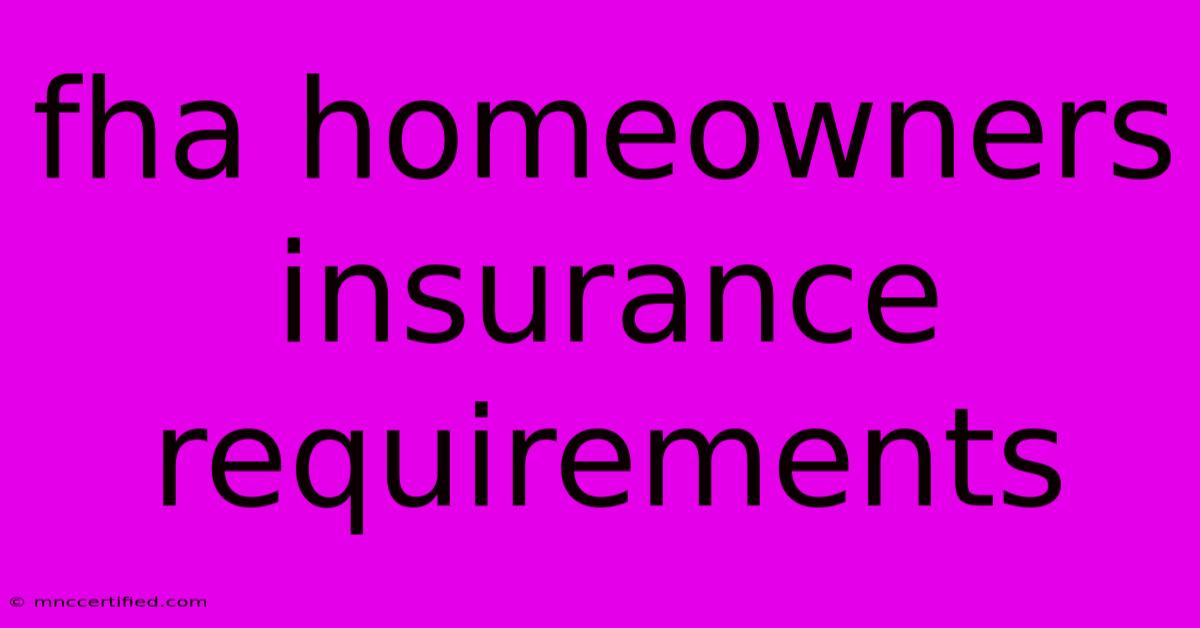Fha Homeowners Insurance Requirements

Table of Contents
FHA Homeowners Insurance Requirements: What You Need to Know
The Federal Housing Administration (FHA) offers mortgage insurance to help make homeownership more accessible. However, along with the benefits come certain requirements, including strict guidelines for homeowners insurance. Understanding these requirements is crucial for securing an FHA loan and protecting your investment.
This comprehensive guide will delve into the essential aspects of FHA homeowners insurance, covering:
- What FHA homeowners insurance covers
- Required coverage amounts
- Specific FHA insurance requirements
- Finding the right FHA-approved insurance
- Tips for managing your FHA insurance
Let's explore these details to ensure you're fully prepared for the FHA homeownership journey.
What Does FHA Homeowners Insurance Cover?
FHA homeowners insurance policies are similar to standard homeowner's insurance, providing coverage for:
- Dwelling Coverage: Protects your home's structure against perils like fire, windstorm, and hail damage.
- Personal Property Coverage: Insures your belongings inside the house, including furniture, electronics, and clothing.
- Liability Coverage: Provides protection if someone is injured on your property or you cause damage to someone else's property.
- Additional Living Expenses (ALE): Covers temporary housing and living costs if your home becomes uninhabitable due to a covered event.
It's important to note that FHA insurance may not cover all perils, and there may be specific exclusions, deductibles, and limits. Always review your policy carefully to understand exactly what's covered and what's not.
Required Coverage Amounts for FHA Loans
FHA mandates minimum coverage amounts for your dwelling and personal property. These requirements aim to ensure adequate protection for both the borrower and the lender.
- Dwelling Coverage: This must be at least equal to the loan amount, or the replacement cost of the property, whichever is greater.
- Personal Property Coverage: You'll need coverage for at least 40% of your dwelling coverage.
Remember, it's always wise to consider additional coverage beyond the minimum requirements. Higher coverage levels can provide greater peace of mind and financial security in case of significant losses.
Specific FHA Insurance Requirements:
Beyond the basic coverage, FHA has specific requirements for homeowners insurance policies:
- FHA-Approved Insurers: You must obtain insurance from a company approved by the FHA. This ensures the insurer meets specific financial stability and underwriting standards.
- Mortgage Clause: Your policy must include a "mortgage clause" that names the FHA as a loss payee. This ensures the lender's interest is protected in case of a claim.
- Flood Insurance: If your property is located in a flood-prone area, you will need flood insurance in addition to standard homeowners insurance. The FHA will require you to obtain this coverage separately from an approved provider.
Understanding and meeting these specific requirements is essential to avoid delays or complications during the mortgage process.
Finding the Right FHA-Approved Insurance:
- Contact your mortgage lender: Your lender will provide a list of approved insurance companies.
- Use an online comparison tool: Many websites allow you to compare quotes from multiple FHA-approved insurers.
- Ask for recommendations: Speak to friends, family, or neighbors who have FHA mortgages for their insurance recommendations.
When comparing quotes, consider factors like coverage limits, deductibles, and the insurer's financial stability and customer service.
Managing Your FHA Homeowners Insurance:
- Review your policy annually: Ensure your coverage levels are still appropriate, and make any necessary updates to reflect any changes in your home's value or your belongings.
- Pay your premiums on time: Late payments can affect your credit score and potentially jeopardize your mortgage.
- Keep your contact information updated: Ensure your insurer has your current address, phone number, and email address for communication purposes.
- File claims promptly: Don't delay reporting any damages to your home or belongings.
Staying organized and proactive with your FHA insurance will help you avoid potential problems and protect your financial investment.
Final Thoughts:
Meeting FHA homeowners insurance requirements is a crucial step in securing an FHA loan and protecting your home. By understanding the coverage, required amounts, and specific mandates, you can navigate this process smoothly and gain peace of mind. Remember to shop around for the best rates and coverage, and keep your policy updated to ensure optimal protection for your home and belongings.

Thank you for visiting our website wich cover about Fha Homeowners Insurance Requirements. We hope the information provided has been useful to you. Feel free to contact us if you have any questions or need further assistance. See you next time and dont miss to bookmark.
Featured Posts
-
Charlotte Tilbury For Serious Glow
Nov 10, 2024
-
Bangladesh Beats Afghanistan In 2nd Odi
Nov 10, 2024
-
Colorado Vs Texas Tech Football Live Stream
Nov 10, 2024
-
Honolulu Bad Faith Insurance Attorney
Nov 10, 2024
-
Wife Of Stuart Hogg Reacts To Abuse Claims
Nov 10, 2024